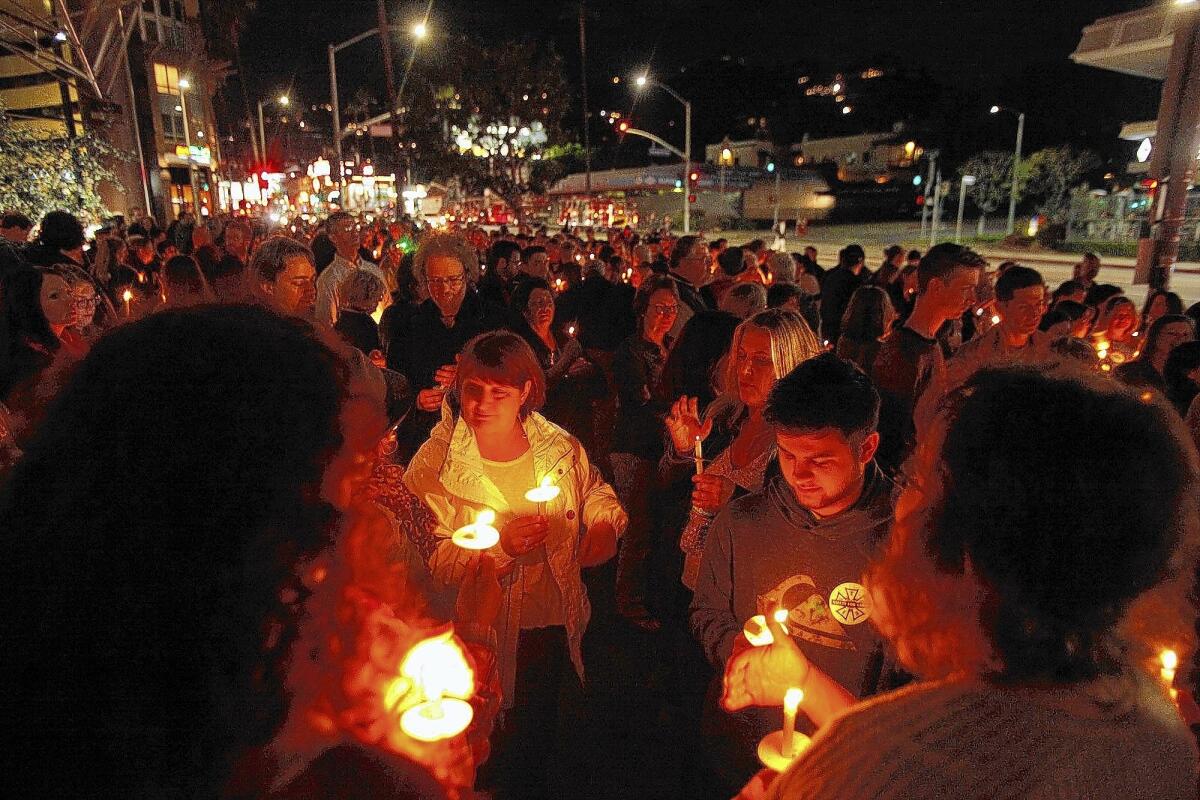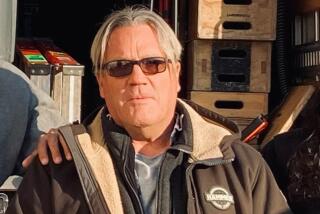Sarah Jones’ death calls attention to film crews’ safety

The film crew walked out on the old railroad trestle high above Georgia’s Altamaha River, then placed a metal-frame bed on the tracks for actor William Hurt.
The plan called for Hurt to lie on the bed in a dream sequence for the film “Midnight Rider,” in which he plays rock singer Gregg Allman. Two trains had already crossed the bridge that day, and the crew was told no more were scheduled, hairstylist Joyce Gilliard recalled.
Then a train came barreling toward them.
“We all ran for our lives,” Gilliard said. “All I could think of was my family getting that call...”
PHOTOS: Notable deaths of 2014
Crew members scrambled to get themselves and their gear to the side, but couldn’t get the bed off the tracks. The locomotive smashed into it. Sarah Jones, a 27-year-old camera assistant, was killed, struck by metal shards from the bed and by the train itself, according to witnesses and a police report. Six other crew members on the bridge were injured.
Film and TV sets have always been dangerous places. Last year, three people died during a shoot for a Discovery Channel show when a helicopter crashed in Acton. In 2012, a diver died preparing an underwater scene for the Disney movie “The Lone Ranger.”
But the Feb. 20 fatality in Georgia has triggered an extraordinary response, with Hollywood’s “below-the-line” corps of working crew members seizing on Jones’ death to rally for safer working conditions. In Hollywood, hundreds of workers joined in a candlelight vigil to remember Jones this month, and more than 55,000 people signed an online petition to add Jones’ name to the Academy Awards’ “In Memoriam” tribute. The academy agreed to show Jones’ name and photo during the Oscar telecast.
“It hits home for a lot of us because we spend so many hours and 100% of our energy trying to get shots,” said Michael Allowitz, a veteran first assistant director who worked with Jones on the TV show “The Vampire Diaries.” “Everybody realizes it could have really been them put in this situation. We’ve all put ourselves in compromising positions to fulfill someone’s vision.”
Since the accident, workers have pressured their unions to step up efforts to ensure that other states have the same safety standards and training that is required in California, something they say is especially important on low-budget productions.
“We need to remind the crew that they have a voice and that if they see something that is unsafe they need to speak up without fear of losing their jobs,” said Chris “C.C.” Clark, a set lighting technician who also worked on “Vampire Diaries” and started a Sarah Jones Safety Committee with his Atlanta-based union, IATSE Local 479.
ON LOCATION: Where the cameras roll
What happened that day on the Georgia railroad trestle is under investigation by the Occupational Safety and Health Administration, the National Transportation Safety Board, the Federal Railroad Administration and the Georgia Bureau of Investigation.
The film was being produced by Unclaimed Freight, an independent film company based in Pasadena and co-owned by Randall Miller and his wife, Jody Savin. Savin and Miller, who directed the film, declined to comment. The film’s production was suspended after the accident.
Unclaimed Freight and its local production partner, Meddin Studios, had permission to film on property around the historic Doctortown Railroad Trestle in Wayne County, Ga., said Russell Schweiss, a spokesman for landowner Rayonier Inc.
But the film producers did not have permission to film on the railway trestle itself, which is owned by railroad company CSX, according to the Wayne County Sheriff’s Office. A CSX spokeswoman declined to comment, citing the investigations.
Gilliard said she was preparing Hurt’s hair in the minutes before the accident occurred. She said she and her colleagues were concerned that another train might be coming, but were told by production staff that no more were scheduled that day.
Hurt declined to comment, but he described what happened in an email to a friend. In that email, obtained by The Times, Hurt said he was twice assured that the bridge was safe for filming. He then asked “how long the crew had to get off if by some impossible chance another train came” and was told 60 seconds.
PHOTOS: Notable deaths of 2013
“I said, ‘Sixty seconds is not enough time to get us off this bridge.’ There was a communal pause. No one backed me up. Then, we ..... Just went ahead. I took off my shoes, got on the heavy, metal hospital bed and began preparing,” Hurt wrote. Then the train came. “We didn’t have sixty seconds. We had less than thirty.”
Union representatives and Wayne County Sheriff John Carter have said there was no railroad representative on site. The “Guidelines for Railroad Safety” bulletin, published by an industry safety committee, states that railroad representatives should always be on site when crews are filming around trains, and that no objects should be placed on the track.
“It’s not complicated,” said cinematographer John Lindley, who said he took a two-day class on train safety before filming the 1995 movie “Money Train.” “If you have a permit to film on or near railway tracks, there is always a representative of the railway with you, and that person has a wireless contact with at least a dispatcher who knows exactly where the train is.”
On a previous Georgia location shoot in 2012, Unclaimed Freight violated permit rules while shooting scenes for “CBGB,” a film about the legendary New York nightclub, said William Hammargren, interim film services administrator for the City of Savannah Film Office.
The firm’s crews removed a stop sign from a street without permission and failed to replace it, he said. “It was definitely a safety issue,” he said.
The DVD of “CBGB” includes an extra feature in which the filmmakers describe their style of “guerrilla shooting.” One scene shows a child wandering through a field of cows as director Miller asks in a voice-over, “I don’t think it’s dangerous at all to have a little kid running through cows, do you think?”
ON LOCATION: Where the cameras roll
Jones was a native of West Columbia, S.C., who began her film career interning on the set of the TV series “Army Wives,” where she was known as one of the most popular crew members.
When tempers flared on set, Jones had a calming effect, said Lloyd Ahern, director of photography on “Army Wives.”
At a memorial in Atlanta, Bruce Doering, executive director of IATSE Local 600, said Ahern told him that “If Sarah was nearby, her presence was like sprinkling pixie dust and everything would cool down.”
Jones took the job on “Midnight Rider” after production of “Fast & Furious 7” was suspended when Paul Walker died in a car crash in Valencia.
“Only a person like Sarah could have had this big a reaction in the industry,” said Amanda Etheridge, a friend who worked with Jones on “Army Wives.” “She was an infectious personality.”
Richard Jones said his daughter was thrilled to be working on Hollywood productions and had hoped for a long career.
“She really loved this industry and was just excited to be doing what she wanted to do,” he said. “I really don’t want anyone else to have to go through this. I don’t see a reason why lives need to be lost while making a movie or a TV show.”
More to Read
From the Oscars to the Emmys.
Get the Envelope newsletter for exclusive awards season coverage, behind-the-scenes stories from the Envelope podcast and columnist Glenn Whipp’s must-read analysis.
You may occasionally receive promotional content from the Los Angeles Times.










